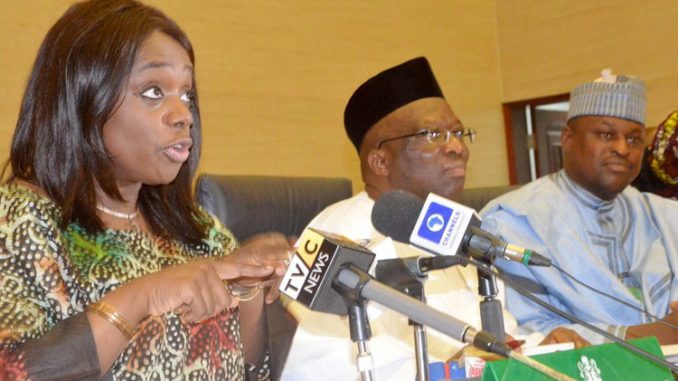
Nigeria’s finance minister, Kemi Adeosun, said on Thursday that the ongoing economic reforms by the federal government is to enhance fiscal discipline, improve revenue generation, and promote allocation and efficient use of resources by the three tiers of government.
Also, the minister said, the reforms have been geared towards wealth creation, employment generation, poverty reduction, development of the non-oil sector and value re-orientation.
The minister spoke through the permanent secretary, Federal Ministry of Finance, Mahmoud Isa-Dutse, in a keynote address she sent to a retreat in Uyo organised by the ministry in collaboration with the Federation Account Allocation Committee, FAAC on the theme “Enhancing the Effectiveness of FAAC.”
Mrs. Adeosun underlined the need to refocus attention on quality investments in sectors including agriculture, manufacturing, mines and steel as well as the promotion of micro, small and medium enterprises, MSMEs as the critical contributors to the growth of the Gross Domestic Product, GDP.
“The promotion of MSMES, initiation of N-Power and a number of other programmes were designed to empower the citizenry, encourage private enterprises and change the way government does business,” she said.
“It is my firm belief that the pursuit of economic diversification through the promotion of private enterprises is one of the ways we can unlock the untapped socio-economic potentials for social progress, economic growth and national development,” Mrs. Adeosun said.
She said she was glad the present administration was intensifying efforts to diversify the economy, assuring that the multiplier effect would soon become obvious.
The retreat, which was attended by all the commissioners of finance and accountants-general from the 36 states of the federation, is coming at a time the country is combating recession in the face of dwindling revenues.
This retreat, she further explained, was predicated on the need to provide participants with the platform to contribute to the ongoing efforts to mitigate the shocks the economy was experiencing as a result of the revenue shortfalls.
Mrs. Adeosun urged participants to collectively come up with constructive ideas that would facilitate the implementation of the present government’s Economic Recovery and Growth Plan, ERGP, aimed at achieving sustained inclusive growth through structural transformation and diversification of the economy.
The three tiers of government, she noted, should apply the best international best practice in public financial management by blocking all loopholes and strengthen financial management.
Mrs. Adeosun also said there was a need to reposition FAAC for enhanced performance through efficient management of accrued scarce resources for national development.
The Akwa Ibom State governor, Udom Emmanuel, who was represented by his deputy, Moses Ekpo, reiterated the call for the review of the current revenue allocation formula by the National Assembly.
“Given our common experience about development in our country, our revenue sharing formula should be weighted more towards the states and local government councils than the practice today,” Mr. Emmanuel said inter alia.
The governor used the occasion to announce that Akwa Ibom has successfully launched itself as a major producer of tomatoes, onions and cassava in commercial quantity as a result of efforts by his administration to diversify the economic base of the state.
“Our state has joined the league of others in the production of cocoa, rice and other cash crops in commercial quantities,” he added.
END

Be the first to comment